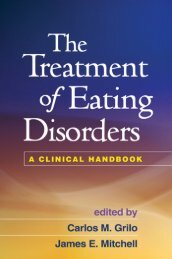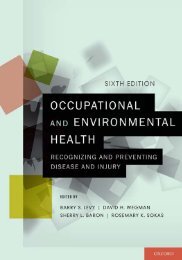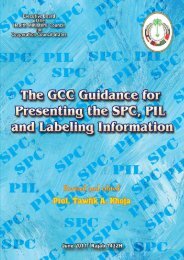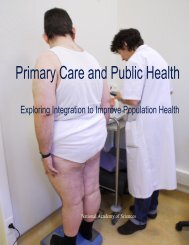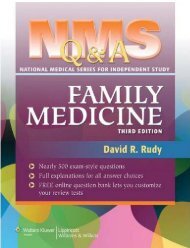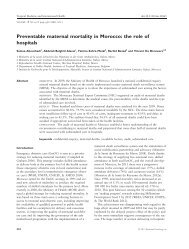Preventing Childhood Obesity - Evidence Policy and Practice.pdf
Preventing Childhood Obesity - Evidence Policy and Practice.pdf
Preventing Childhood Obesity - Evidence Policy and Practice.pdf
Create successful ePaper yourself
Turn your PDF publications into a flip-book with our unique Google optimized e-Paper software.
CHAPTER 5<br />
A h uman r ights a pproach to c hildhood<br />
o besity p revention<br />
Naomi Priest, 1 Boyd Swinburn 2 <strong>and</strong> Elizabeth Waters 1<br />
1 Jack Brockoff Child Health <strong>and</strong> Wellbeing Program, McCaughey Centre, Melbourne<br />
School of Population Health, University of Melbourne, Melbourne, Australia<br />
2 WHO Collaborating Centre for <strong>Obesity</strong> Prevention, Deakin University, Melbourne, Australia<br />
Summary<br />
• Three sets of human rights are relevant to childhood<br />
obesity: UN Convention on the Rights of the Child<br />
( UNCROC ), the right to adequate food, <strong>and</strong> the<br />
right to health.<br />
• Within UNCROC, the “developmental rights ”<br />
(right to develop to the fullest <strong>and</strong> the right to protection<br />
from harmful influences, abuse <strong>and</strong> exploitation)<br />
are to protect children from circumstances<br />
injurious to their well - being.<br />
• The marketing of unhealthy food <strong>and</strong> beverages to<br />
children is an example of commercial exploitation<br />
of children.<br />
• The right to adequate food was originally aimed at<br />
preventing undernutrition <strong>and</strong> food insecurity, but<br />
has now been broadened to include overnutrition<br />
in vulnerable populations.<br />
• It is the right of everyone to enjoy the highest attainable<br />
st<strong>and</strong>ard of physical <strong>and</strong> mental health, <strong>and</strong> for<br />
children this may include freedom from obesity.<br />
• The use of a human rights approach to preventing<br />
childhood obesity helps to ensure that the debates<br />
<strong>and</strong> actions centre on what is best for children <strong>and</strong><br />
the Sydney Principles to guide substantial reductions<br />
in food marketing of unhealthy foods that targets<br />
children is one example of such an application.<br />
<strong>Preventing</strong> <strong>Childhood</strong> <strong>Obesity</strong>. Edited by<br />
E. Waters, B.A. Swinburn, J.C. Seidell <strong>and</strong> R. Uauy.<br />
© 2010 Blackwell Publishing.<br />
Introduction<br />
The relationship between human rights <strong>and</strong> health is<br />
one that is now increasingly discussed throughout<br />
the world <strong>and</strong> rights - based approaches to public<br />
health issues are being promoted as having much<br />
to contribute to addressing health inequalities <strong>and</strong><br />
achieving sustainable gains in population health. 1 – 4 To<br />
date, this relatively recent consideration of the relationship<br />
between human rights <strong>and</strong> health has largely<br />
concentrated on the right of individuals to health care<br />
<strong>and</strong> treatment <strong>and</strong> on the protection of individuals<br />
from physical harm. 5 For example, rights - based<br />
approaches have been used to advocate for strengthened<br />
health care systems, to target maternal mortality<br />
<strong>and</strong> reproductive health, mental health care, <strong>and</strong><br />
neglected diseases, <strong>and</strong> to raise the profile of underlying<br />
determinants such as the right to water <strong>and</strong> sanitation.<br />
10 The work of the UN Special Rapporteur<br />
6 –<br />
on the right to health, a position established in 2002,<br />
has done much to promote greater global attention<br />
to health <strong>and</strong> human rights. 11 However, the health<br />
sector has also recently been critiqued for its relative<br />
silence on human rights, with the suggestion that<br />
there is a general lack of awareness within the field<br />
regarding human rights <strong>and</strong> what they mean in<br />
1<br />
practice.<br />
Human rights are essentially freedoms <strong>and</strong> entitlements<br />
that are concerned with protecting the inherent<br />
dignity <strong>and</strong> quality of all human beings, <strong>and</strong> encompass<br />
civil, political, economic, social <strong>and</strong> cultural<br />
12,13<br />
rights. While human rights are inspired by, <strong>and</strong><br />
40





